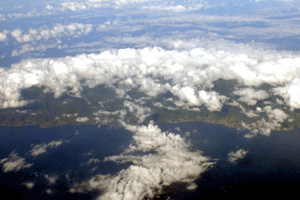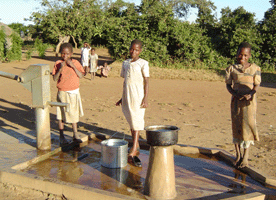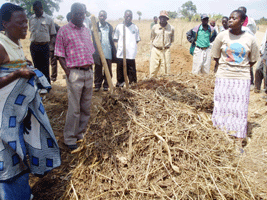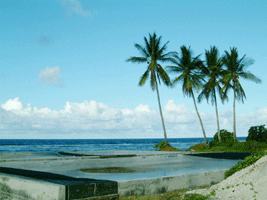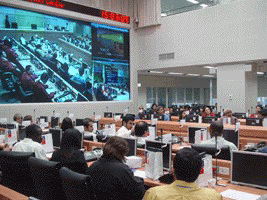
Using Resources Intelligently for a Sustainable World
|
|
|
A sustainable environment depends on the intelligent use of natural resources in order to protect the ecosystem that human beings rely on. However, modernization and rapid industrialization have been putting a strain on the world's natural resources; and it is becoming increasingly difficult to maintain a sustainable environment, due to land destruction, depletion of endangered species, global warming and climate change, and over-harvesting of marine and forest resources. In addition, human migration from rural to urban areas can generate hygiene problems and pollution.
|
Ensuring a sustainable environment has become a global concern. "The Limits to Growth" stated by the Club of Rome in 1972 and the "Rio Declaration" (Earth Charter) and "Agenda 21" declared by the UN Earth Summit in 1992 have shown the relationship between environmentalism and sustainable development. In 2000, the UN included sustainable development for the environment as one of its eight major Millennium Development Goals (MDGs). The declaration of those targets confirmed that international society was placing increased value on sustainable environment and making it one of their major objectives.
A Multi-faceted Approach to Sustainability
In recent years, issues of sustainable development have focused on poverty reduction and environmental protection. The TaiwanICDF has included sustainable development as one of its primary objectives and assists partner countries with development programs that are designed not only to alleviate poverty but also to be environmentally friendly. The Fund applies suitable approaches, which meet the demand for development in the partner countries, while ensuring a sustainable environment through joint efforts with cooperative partners.
|
The TaiwanICDF has carried out environment-friendly development programs through three main areas of operation: The re-use and recycling of natural resources and organic fertilizers, building installations to harness solar power, and introducing the geographic information system (GIS) in developing countries.
Organic Fertilizer Production in Burkina Faso
The TaiwanICDF combined agricultural development and environmental considerations to develop an organic fertilizer production system in Burkina Faso. The objective was to increase food production with hardly any damage to the natural soil. This would enable the people of Burkina Faso to eventually be self-sufficient in the use of organic fertilizers.
Most African countries use chemical fertilizers that are expensive to import, and often not environmentally friendly. With this in mind, from October 2002 to April 2004, the TaiwanICDF implemented an assistance program to help the people of Burkina Faso to produce organic fertilizers as a replacement for chemical fertilizers. The results proved not only cost effective but also improved soil quality, leading to increased production.
Reusing and Recycling Compost Materials in Malawi
|
In Malawi, efforts made to build a sustainable environment included using animal waste compost and organic fertilizers made from local materials. Such materials can be reused and recycled, increasing nutritional content and the capacity of soil to absorb water. This increases land productivity, and, because crops require less irrigation, water consumption is reduced.
The changing global climate has resulted in insufficient and unevenly distributed rainfall in Malawi. Production of corn, the main staple of the country, has not been sustained due to the high cost of chemical fertilizers. An effective alternative was for Malawian farmers to use animal waste compost. To this end, the TaiwanICDF Technical Mission in Malawi taught farmers how to set up collection stations for urine to be used in compost preparation. As well as helping to reduce costs, the collection of animal waste helps improve hygiene and health for the local livestock industry.
Harnessing Alternative Power Sources
Nauru, an island country in the South Pacific, lacks fuel to generate sufficient electricity, a situation that causes frequent power outages.
|
However, the 2004 Climate Report by the EU noted that Nauru enjoys long hours of solar radiation. Harnessing solar power is therefore one means of addressing the problem of the island's frequent power failures.
The TaiwanICDF has designed a project to install 60 solar panel systems in Nauru, with two 18W lighting devices for each household. The project will soon be implemented and it is estimated that it will generate 6,307W annually, reducing carbon emissions by 3,910 kg per year.
Taiwan's Technology Aimed at Needs of Partners
Most developed countries use Geographic Information Systems (GIS) in their national land planning, while many developing countries have to rely on primitive surface survey technology and the compilation of artificially generated data.
In 2006, the TaiwanICDF held its first workshop on GIS for land development planning. This year, a second workshop was held, this time focusing on environment monitoring and natural disaster prevention, topics which are more directed toward the needs of partner countries. The workshop sought to introduce GIS to developing countries and to show how this technology can be used in forestry management, ocean surveying, pollution surveillance, land surveying, and natural resources management. GIS, it was shown, is especially useful in disaster prevention, and in fostering a sustainable environment.
|
The workshop included visits to government agencies in Taiwan that employ GIS to observe firsthand the application and benefits of the technology. Participants received an introduction to Taiwan's GIS policy framework, practical systems, and how government funding has helped foster industrial development and technology upgrading, and created a model for cooperation between government and industry. In addition, the workshop demonstrated the ability of Taiwan's GIS industry to customize software at reasonable prices, to fit the specific needs of Taiwan's partner countries.
Looking Ahead
Of the TaiwanICDF's many operations, environmental protection is still a relatively new field. But the above examples show that the Fund is taking steps to help other countries and, thus, the world create a healthier, more sustainable planet.
A stable, intact environment is crucial to long-term development, but this is unachievable without a coordinated multilateral response from all members of the global village. To this end, Taiwan will continue to make great strides in developing environmental protection strategies and technologies to support its partner countries as they strive for economic progress.
* This article is a collaborative work between Taiwan News and the TaiwanICDF.
- 更新日期: 2022/05/11
- 點閱次數:746

